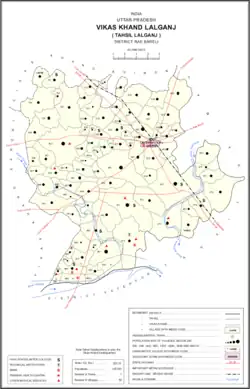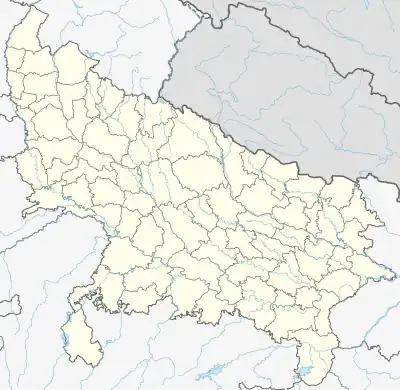Fakhruddinpur
Fakhruddinpur is a village in Lalganj block of Rae Bareli district, Uttar Pradesh, India.[2] As of 2011, it has a population of 823 people, in 136 households.[2] It has 2 primary schools and no healthcare facilities, and it hosts a permanent market but not a weekly haat.[2] It belongs to the nyaya panchayat of Bahai.[3]
Fakhruddinpur | |
|---|---|
Village | |
 Map showing Fakhruddinpur (#880) in Lalganj CD block | |
 Fakhruddinpur Location in Uttar Pradesh, India | |
| Coordinates: 26.112877°N 80.008569°E[1] | |
| Country India | |
| State | Uttar Pradesh |
| District | Raebareli |
| Area | |
| • Total | 2.989 km2 (1.154 sq mi) |
| Population (2011)[2] | |
| • Total | 823 |
| • Density | 280/km2 (710/sq mi) |
| Languages | |
| • Official | Hindi |
| Time zone | UTC+5:30 (IST) |
| Vehicle registration | UP-35 |
The 1951 census recorded Fakhruddinpur (as "Fakharuddinpur") as comprising 3 hamlets, with a total population of 238 people (117 male and 121 female), in 51 households and 35 physical houses.[4] The area of the village was given as 210 acres.[4] 32 residents were literate, all male.[4] The village was listed as belonging to the pargana of Dalmau and the thana of Dalmau.[4]
The 1961 census recorded Fakhruddinpur (as "Fakharuddinpur") as comprising 3 hamlets, with a total population of 293 people (149 male and 144 female), in 52 households and 52 physical houses.[5] The area of the village was given as 210 acres.[5]
The 1981 census recorded Fakhruddinpur (as "Fakharudinpur") as having a population of 448 people, in 94 households, and having an area of 87.42 hectares.[6] The main staple foods were listed as wheat and rice.[6]
The 1991 census recorded Fakhruddinpur (as "Fakruddinpur") as having a total population of 545 people (265 male and 280 female), in 87 households and 85 physical houses.[3] The area of the village was listed as 76 hectares.[3] Members of the 0-6 age group numbered 131, or 24% of the total; this group was 55% male (72) and 45% female (59).[3] Members of scheduled castes made up 34% of the village's population, while no members of scheduled tribes were recorded.[3] The literacy rate of the village was 31% (117 men and 54 women).[3] 114 people were classified as main workers (112 men and 2 women), while 120 people were classified as marginal workers (all women); the remaining 311 residents were non-workers.[3] The breakdown of main workers by employment category was as follows: 70 cultivators (i.e. people who owned or leased their own land); 27 agricultural labourers (i.e. people who worked someone else's land in return for payment); 0 workers in livestock, forestry, fishing, hunting, plantations, orchards, etc.; 0 in mining and quarrying; 0 household industry workers; 4 workers employed in other manufacturing, processing, service, and repair roles; 2 construction workers; 3 employed in trade and commerce; 1 employed in transport, storage, and communications; and 7 in other services.[3]
References
- Do a radial search using these coordinates here https://geonames.nga.mil/namesgaz/.
{{cite web}}: Missing or empty|title=(help) - "Census of India 2011: Uttar Pradesh District Census Handbook - Rae Bareli, Part A (Village and Town Directory)" (PDF). Census 2011 India. pp. 288–306. Retrieved 19 October 2021.
- Census 1991 Series-25 Uttar Pradesh Part-XII B Village & Townwise Primary Census Abstract District Census Handbook District Raebareli (PDF). 1992. pp. xxiv–xxviii, 198–9. Retrieved 19 October 2021.
- Census of India, 1951: District Census Handbook Uttar Pradesh (42 - Rae Bareli District) (PDF). Allahabad. 1955. pp. 108–9. Retrieved 19 October 2021.
{{cite book}}: CS1 maint: location missing publisher (link) - Census 1961: District Census Handbook, Uttar Pradesh (39 - Raebareli District) (PDF). Lucknow. 1965. pp. lxxviii-lxxix of section "Dalmau Tahsil". Retrieved 19 October 2021.
{{cite book}}: CS1 maint: location missing publisher (link) - Census 1981 Uttar Pradesh: District Census Handbook Part XIII-A: Village & Town Directory, District Rae Bareli (PDF). 1982. pp. 156–7. Retrieved 19 October 2021.